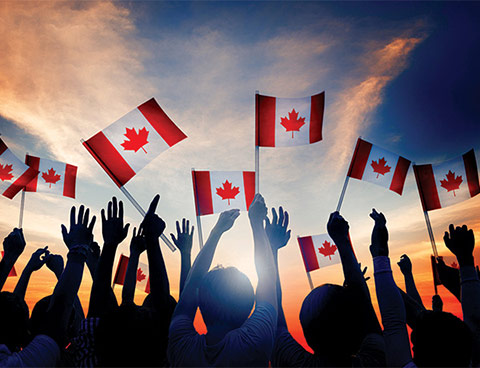Looking back 150 years to Canada’s earliest days as a country, Peter Russell, a professor emeritus of political science, credits the Fathers of Confederation with laying the groundwork for a country that has become one of the world’s most diverse. Russell, the author of Canada’s Odyssey: A Country Based on Incomplete Conquests, spoke recently with U of T Magazine editor Scott Anderson.
Canada has thrived for 150 years. What do you think the Fathers of Confederation did best?
Number one, they saved us from becoming American.
You say that like there’s something wrong with being American …
Not at all. But without Confederation, we would not have taken a different path from the U.S., or built this deeply diverse country that could yet turn out to be greater than the U.S. as a bastion of liberty in the world.
French-Canadian culture certainly would have been threatened had Canada joined the United States…
With the union of Lower and Upper Canada in 1840, the French Catholics were in danger of disappearing in a tide of English Protestant immigration. With Confederation, the French got a province in which they’d be the majority and could protect their distinct culture. This was good for all Canadians. It set the stage for a society that would celebrate diversity.
So Canada’s openness to many different peoples dates to 1867?
It actually began earlier. To this day, French Canada sees the Quebec Act of 1774 as its Magna Carta, which guaranteed freedom of worship. This did not exist anywhere in the world in 1774, and certainly not in the United Kingdom.
This openness didn’t extend to Indigenous Peoples, though.
No. The plan was for assimilation: to put the kids in residential schools and make them Christian Canadians. This was a complete betrayal. The Aboriginal nations were crucial allies of the British, who had promised to respect their independence and prevent settlers from taking their land.
If you could travel back in time, what might you advise the Fathers of Confederation to do differently?
They didn’t spell out in the Constitution how parliamentary democracy actually works. It had never been spelled out in England, so I understand why they didn’t do it here. But most Canadians now, including those active in political life, don’t have a good grasp of the fundamental principles of our parliamentary democracy or the important conventions of our Constitution. What’s the Prime Minister’s Office? Who’s in the cabinet? We need a good, clear summary that is authoritative and non-partisan, can be put online and taught in schools, and can be read by any citizen.
Some people see an unelected Senate as a mistake.
We’re sorting it out. Independent senators are what John A. Macdonald wanted but never delivered himself. Today’s independent senators are showing good sense. They’re not insisting on getting their way. And they’ve improved some legislation.
Do you think we’ll ever bring Quebec into the Constitution?
Yes! The Quebec government recently released a document called Quebecers: Our Way of Being Canadian. It’s very pro-Canadian. But it also says that Canada needs to recognize Quebec, in all its diversity, as a nation within Canada. And the document does this without threatening a referendum on independence. Unfortunately, so far, the rest of Canada has said, “We’re not going to listen to you.” But I’m optimistic.
What should Canadians recognize about their country?
We have three national pillars: English-speaking Canada, French Canada and Indigenous Canada. Get interested in one of the other pillars. Get to know it. There will be crises here and there but we’ll live to fight another day. It’s a terrific country.







No Responses to “ What Canada Got Right ”
As a historian, I was deeply interested in and appreciative of Professor Peter Russell's broad-stroke overview of our Canadian heritage. In one answer, he states that the 1774 Quebec Act was the first legal guarantee of freedom of worship in the world and that even Great Britain did not have such. The English Toleration Act of 1689, however, did guarantee freedom of worship for Protestants outside of the state church, though not for Roman Catholics. The Quebec Act was an advance on this in that it included Catholics -- a small, though not unimportant detail, not clearly indicated by Prof. Russell's answer.
Michael Haykin
BA 1974 Victoria, ThD 1982
Dundas, Ontario
Thanks for this great interview. I am proud to be Canadian, having been born 90 years after Confederation. I have two of the country's "national pillars" in my own family: the majority of my relatives are English Canadian, and we date our arrival in Canada to the 1840s. Two relatives of mine married First Nations people: my aunt married a man who was part Mohawk, and one of my cousins married a Dene woman from Deer Lake. So I have always been interested in Canadian's Indigenous peoples.
I have also studied the history and language of the "third pillar." I am proud to be a bilingual French- and English-speaking Canadian. Curiously, on two trips to England several years ago, I was approached by staff in various banks to assist French visitors to England. Their assumption was "Well, she's Canadian, she'll speak French as well as English." Luckily for the customers, that assumption was correct.
Peter Russell's book is immensely relevant. In reading it last year, I was truly shocked by how little I had understood Canadian government history. There is so much to make up for. We need to get a better grasp of the lack of communication between governments and Indigenous peoples.